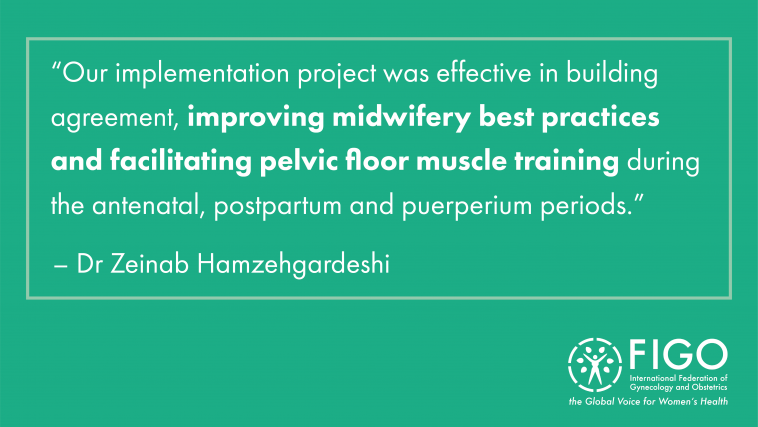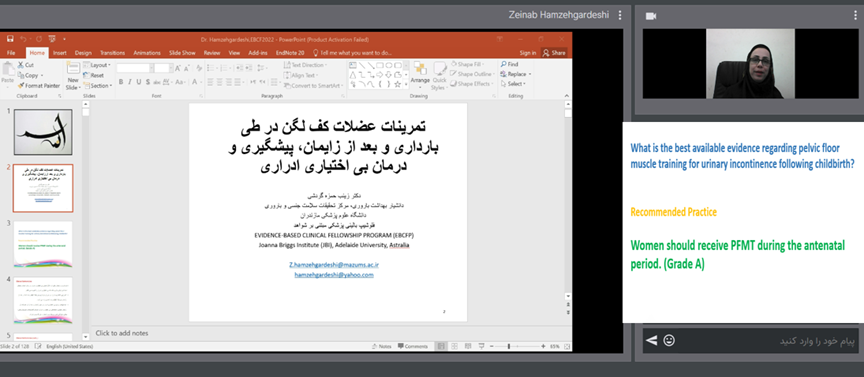Increasing pelvic floor muscle training in the Iranian midwifery practice

Women with urinary incontinence in the course of pregnancy appear to be at higher risk of signs and symptoms of postpartum urinary incontinence than women who do not experience urinary incontinence during pregnancy. Pelvic Floor Muscle Training (PFMT) is a supervised treatment that can be effective in decreasing the symptoms of urinary stress incontinence.
In the Iranian health services, midwives are responsible for the preparation of childbirth classes during antenatal, postpartum and puerperium periods.
Conducting a pelvic floor muscle training best practice implementation project
In November 2021, Dr Zeinab Hamzehgardeshi and her team* started a best practice implementation project on PFMT for the prevention and treatment of urinary incontinence. This project aimed to improve compliance with international evidence-based practice, increasing PFMT in Iranian maternity wards and prenatal care clinics. This project used the JBI Evidence Implementation framework, and was carried out as part of the JBI Evidence-Based Clinical Fellowship Programme (EBCFP).

The project was developed and conducted in two Iranian health centres: the Sexual and Reproductive Health Research Center at Mazandaran University of Medical Sciences in Sari and the Iranian Research Center for Evidence-Based Medicine: A JBI Centre of Excellence at Tabriz University of Medical Sciences in Tabriz.
With the aim of implementing best practice in PFMT for the prevention and treatment of urinary incontinence, the project focused on measuring compliance with four best practice criteria:
- Midwives receive training on PFMT;
- Assessments to identify women at risk of urinary incontinence are carried out;
- Women receive PFMT during the antenatal period;
- Women at high risk of developing urinary incontinence receive a supervised PFMT programme.
To establish the baseline for the project, the team conducted an audit in November 2021. Questionnaires were sent to all the midwives in the two centres to assess access to education for midwives, the prevalence of urinary incontinence risk assessment for pregnant women and the offering of PFMT during the antenatal period. The team also carried out telephone interviews with 30 women who had given birth in the last three months.

The positive outcomes of the implementation project
After establishing the baseline, the project team looked into the main barriers to the fulfilment of each criterion and designed a strategy to improve compliance with best practice in pelvic floor training.
The team worked on updating the urinary incontinence and PFMT education programme for midwives. It also highlighted to health managers the importance of including evidence-based criteria on urinary incontinence in both the hard copy and the online version of women’s health records.
Due to the impact of the COVID-19 pandemic on the workload among midwives, the midwives training programme was delivered through a combination of social media and offline methods. The use of different media contributed to improving midwives’ adherence to evidence-based practices.
Following the implementation of the project, in early January 2022 the team carried out a follow-up audit to assess the outcomes of the interventions that were conducted.
The project team found that:
- The proportion of midwives receiving training on PFMT increased from 60% to 100% in the two health centres;
- The proportion of women assessed to identify their risk for urinary incontinence went from 0% to 67%;
- The proportion of women receiving PFMT during the antenatal period increased from 0% to 50%;
- The proportion of women at high risk of urinary incontinence receiving supervised PFMT programmes went from 0% to 67%.
According to Dr Hamzehgardeshi,
This implementation project was effective in building agreement, improving midwifery best practices, and facilitating Pelvic Floor Muscle Training (PFMT) during antenatal, postpartum and puerperium periods. The findings of this project showed that midwives’ compliance with evidence-based criteria for promoting the practice of PFMT has improved.
The criteria selected and measured by the project team regarding urinary incontinence and supervised PFMT programme implementation are key to improving women’s sexual and reproductive health and wellbeing during and after pregnancy. This project was successfully implemented in Iranian midwifery practice, leading to improvements in women’s health services in the two maternity and health centres where the project was conducted. These outcomes are promising for continuing to improve the provision of women’s health care in the area of urogynaecology and pelvic floor health.
*Project team: Dr Zeinab Hamzehgardeshi, Dr Sakineh Hajebrahimi, Dr Amin Talebpour, Dr Zohreh Shahhosseini, Dr Soghra Khani, Dr Ziaeddin Oladi, Ashraf Norouzi, Dr Sima Razpoosh, Masoumeh Ghazanfari, Fatemeh Zahra Mahdavi, Motahara Sheikhi